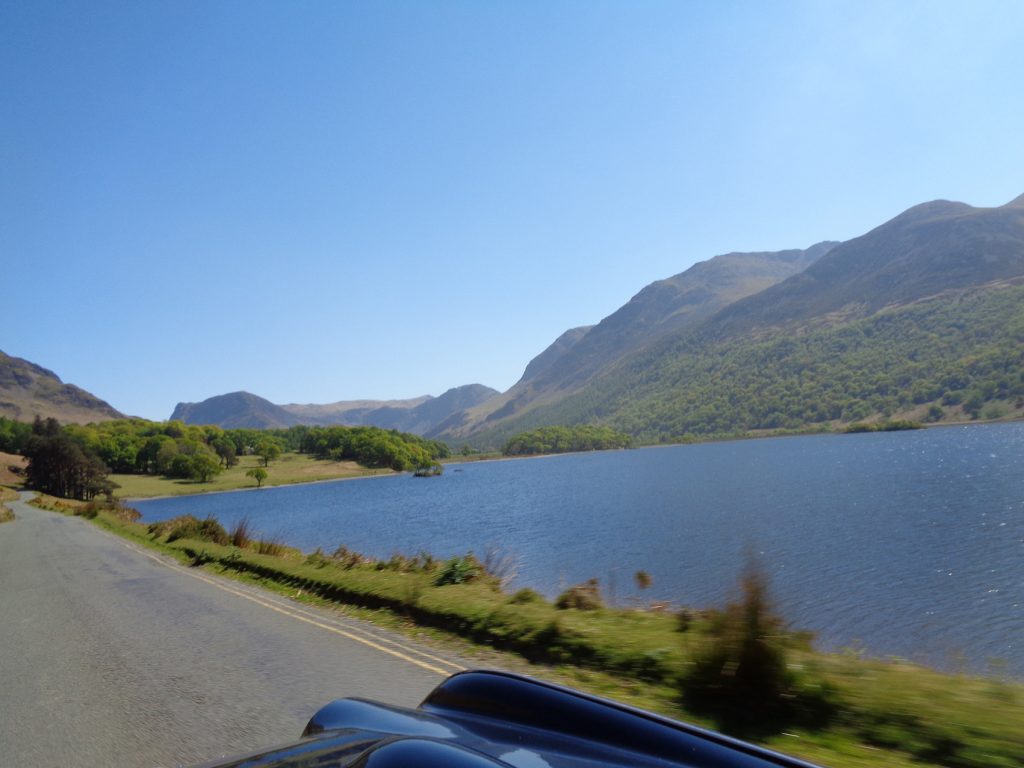
Crummock Water can’t have been as deserted as this since the 1920s. The last time we passed this spot the lakeshore beaches were crowded and thanks to an unexpected tryst between two oversized coaches, a traffic jam over a mile long, had disabled the lane. On 6th May 2020, we saw no motor vehicles and only two bicycles between Buttermere until almost the edge of Keswick, 12 miles later.
Although people now flock and fly to the English Lake District from all over the world, and in 2017 it had the unfortunately dubious distinction[i] of becoming a Unesco World Heritage Site[ii], not so long ago, before it was popularized by the Romantics[iii], Lakeland was considered an ugly, dreary, frightening place. Unless you were born within its supposed gloom, you stayed away. It was an area avoided by those who could afford to travel.
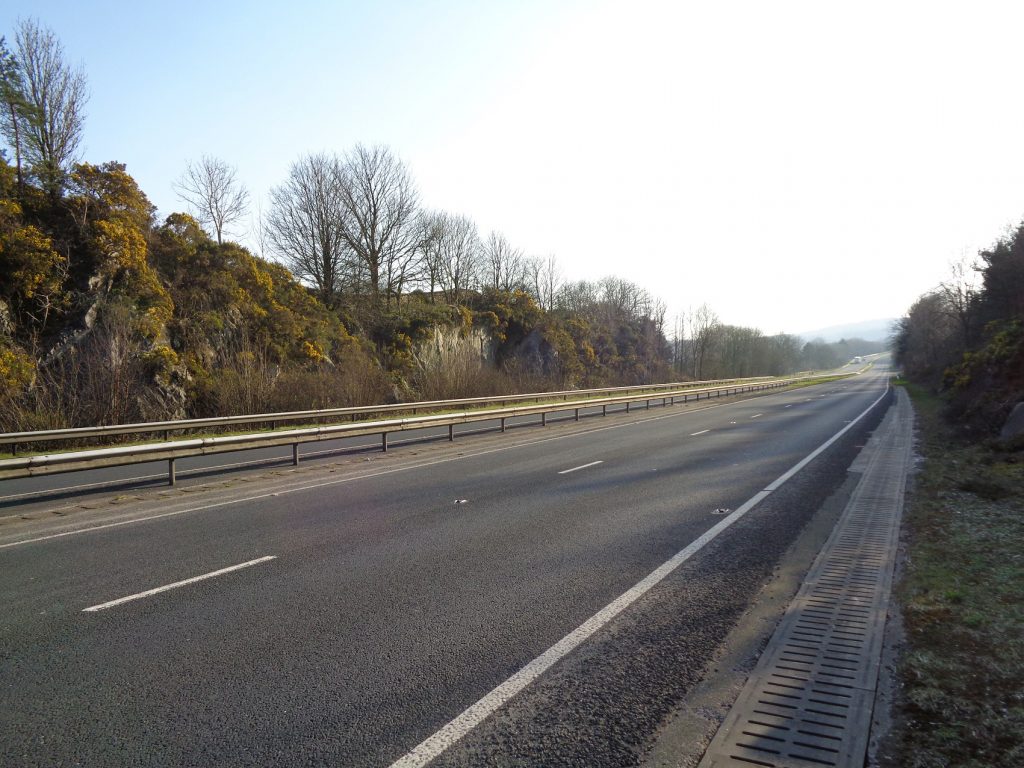
On a cycle over the fells and through the forests south of Windermere, running out of daylight, I used the A590 dual carriageway from High Newton to get home fast. Under normal circumstances, this would be a recklessly stupid idea – especially during rush hour. Although a van is overtaking a lorry in the far distance, there’d usually be at least fifty vehicles in sight. 26th of March 2020.
During the “lockdown period” we have caught glimpses of a Lakeland emptier than it can have been on fair-weather days in spring and early summer for a hundred years. If it’s true that “only 9% of Britons want life to return to ‘normal’ once lockdown is over” [iv] then what will happen to areas like the Lakes? Will they be respected and valued or overused to destruction? Instead of constantly crisscrossing the earth on planes, internationally swapping places to help ruin each other’s countries, has the time come when we should all explore the areas closer to us?
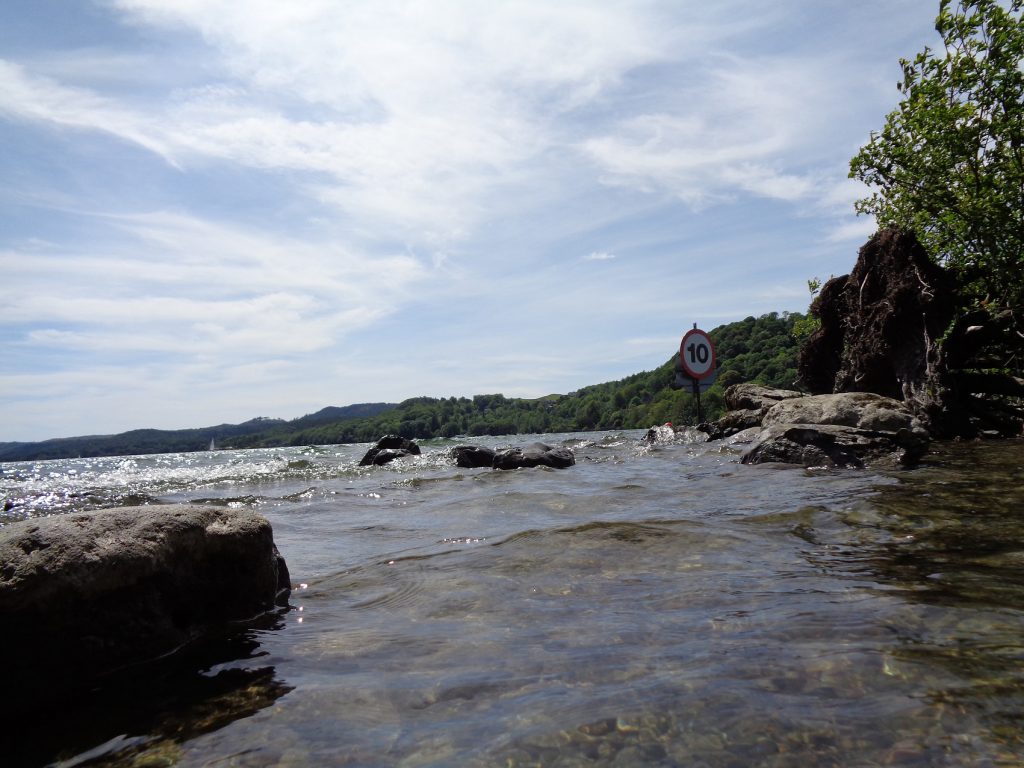
Lake Windermere looking south from Bowness Nab, 25th May 2020
My title: When People Were Away, is partly derived from, Time was Away[v], by poet Alan Ross[vi] and neo-romantic artist John Minton[vii], published in 1948. This colour-illustrated book describes the atmosphere of “Corsica as a microcosm of the Mediterranean” in the period immediately after the second world war, when Europe became open again to travel, to exploration and holiday. Despite that I have only ever seen pictures of the cover, its title has always stuck . . . Much to K’s occasional irritation, I often repeated it aloud when we were travelling around Sardinia with two of our children in 2007[viii]. The phrase When Time was Away (I must have added the When without realizing) summed up, I suppose, both my likely idealization of a vanished post-war era – as illuminated by its art, literature and films – and my (frequent) perception of timelessness. This latter feeling, sometimes becoming metaphysical, can strike particularly in areas off the beaten track. Although, if you’re prepared to climb or search hard, the Lakes still have such areas, generally, in spring and summer, the roads and lanes are often gridlocked, the towns and villages untenable. This year has certainly been different!
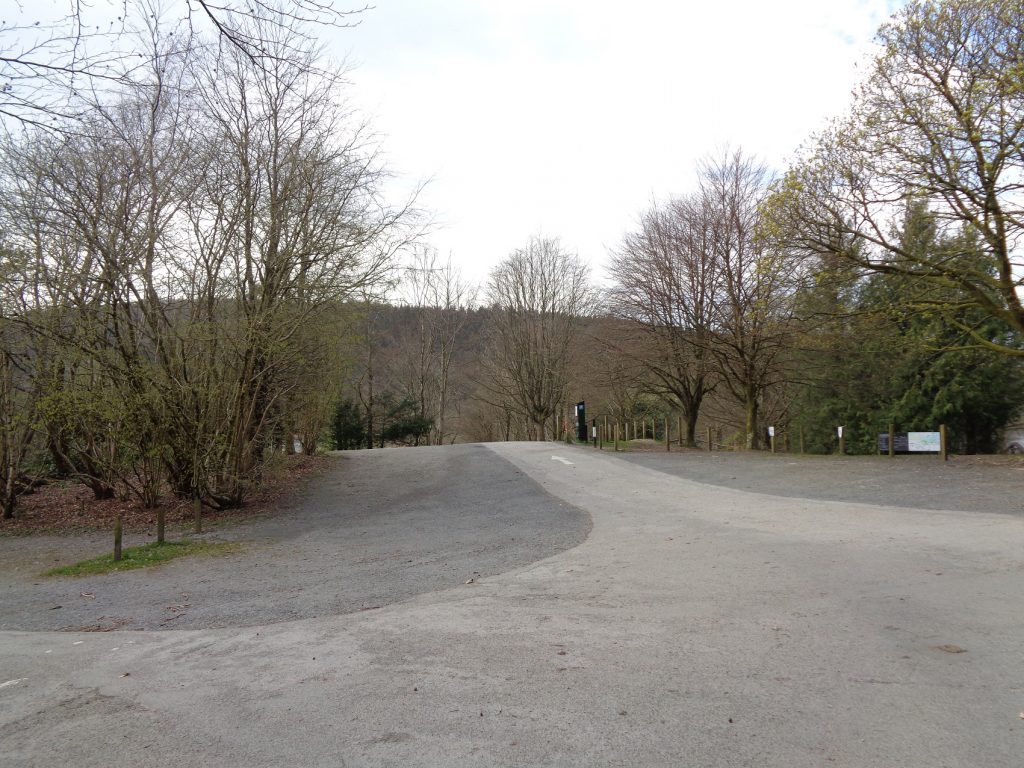
Fell Foot car park (National Trust) on the southern shore of Windermere, 5th April 2020. The entrance gates to a huge area of empty gravel were padlocked, the exit blocked with tree-trunks. Other vast, unused camping sites encountered in the 6 weeks since, don’t make dramatic photos. They simply appear as big grassy fields, the levelled pitches, standpipes and electricity points, almost invisible.
As anyone who has read a little of my Virtual Pub Crawl[ix] in the virtual pages of International Times may remember, pubs to me, exist within a glowing mystique few deserve. Generally, they’re too neat or crowded, drowned out by dreadful canned music or even worse by television, over-concerned with food rather than atmosphere and just too expensive. Of course, I realise that in an effort to survive, many inns and pubs had no choice but to diversify. Burgeoning supermarkets made alcohol proportionally cheaper, while eating joints and takeaways steadily increased the competition. People themselves, from the 1950s and 60s on, gradually preferred to spend more time at home – stuck in front of the goggle-box, or later, their darling PC.
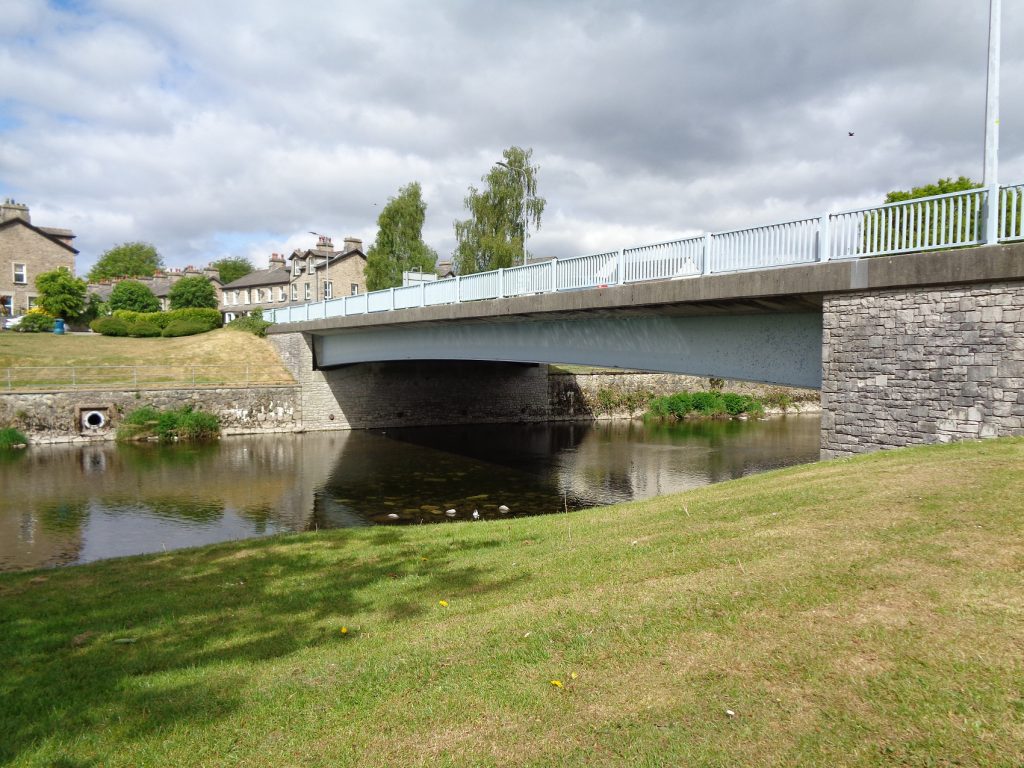
Although built in 1990, the Romney Road bridge in Kendal, youngest of five road bridges crossing the tempestuous river Kent in the town, resembles the architecture of the 60s. On May 13th 2020, it was far quieter than usual – as the town proved to be overall. Cycling was not only safe but pleasant.
Diversification and expansion are two of the cardinal economic rules – driving the less avaricious into bankruptcy while the sharks muscle in, allowing the whole stupid race to continue. When will we stop letting economics rule us? But that withered question comes into the same category of: when will we use our tools rather than let them use us? Or: when will we tell politicians what we want, rather than let them tell us? It’s foretold that the worst of all economic slumps is coming, a depression to end all depressions. But perhaps we should tear up this old rule book with its panic inducing, self-fulfilling prophecies?
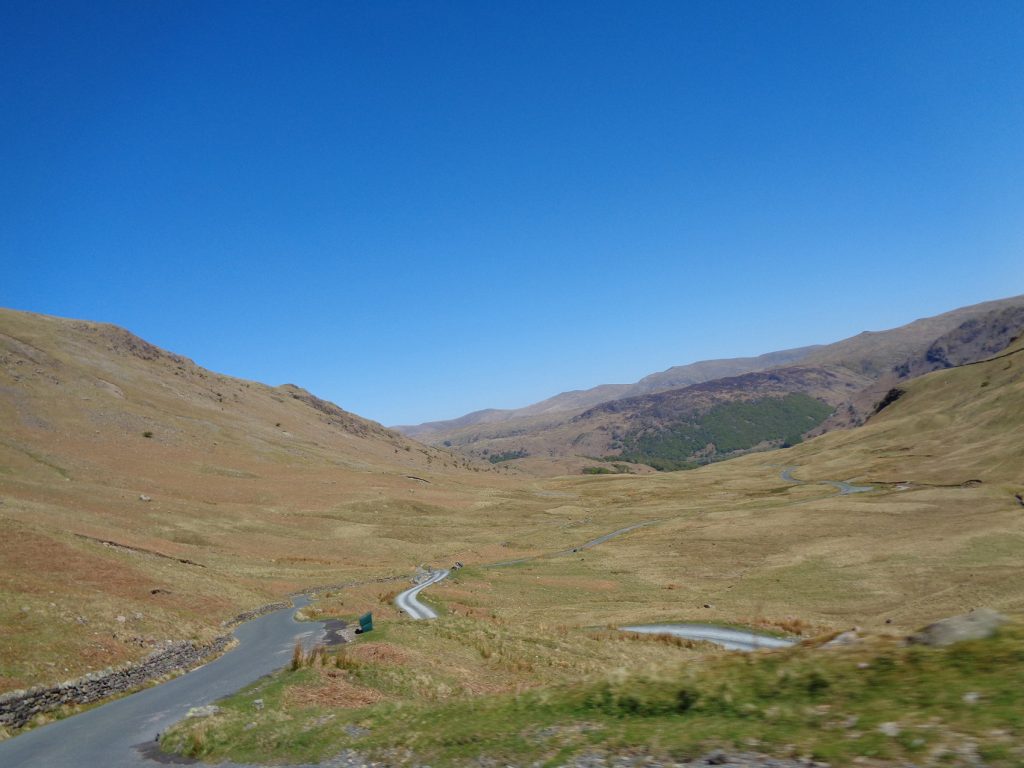
The Honister Pass climbs from Gatesgarth at the southern end of Buttermere over to Seatoller, in Borrowdale. Having just passed the normally busy Honister Slate Mining Museum and Adventure Centre[x] and the nearby Honister Hause Youth Hostel[xi], the road summit view towards Borrowdale is revealed to be unnaturally empty. 6th May 2020
Just as disappointment is exaggerated by over-expectant desire, so the trough of depression is forecast by the summit of profit. What if we don’t need profit? Most of us don’t get any of it anyway: most of it is hung onto by those 10 big companies that control everything we buy[xii]. But the multi-nationals and other organizations that corrupt the direction of the world, that control its media and inflame its excessive energy demands . . . these companies that appear to undermine all our individual efforts to improve things . . . if we don’t want the world to go back to business as usual, all these companies need to be sabotaged. Free-market oxygen has blazed them into a firestorm. A worship of profit has brought us to the brink of ecological disaster. Like it or not, we all go along with this. In wanting what we’re told we want, we sign on the dotted line; in dithering over endless, pointless, ‘choices’, we give our consent; in expecting living standards to always rise, and refusing to accept that but for the poorest, they can’t anymore, we fan the flames. The system was severely cracked from the start, and during “lockdown” people have started to realise that for most of us, personal living standards only rise at the expense of quality of life. They’re dependent upon overwork. With greater equality in our rates of pay and jobs distributed more evenly, we should all begin to adapt to an income based around a three-day week. I fume at the thought of how many genuinely hard-working people could live on the wages of one useless figurehead or overrated CEO. In tolerating such inequality, in struggling to follow edicts which boost a society almost nobody wants, we poison whatever we might make of our consequently limited future.
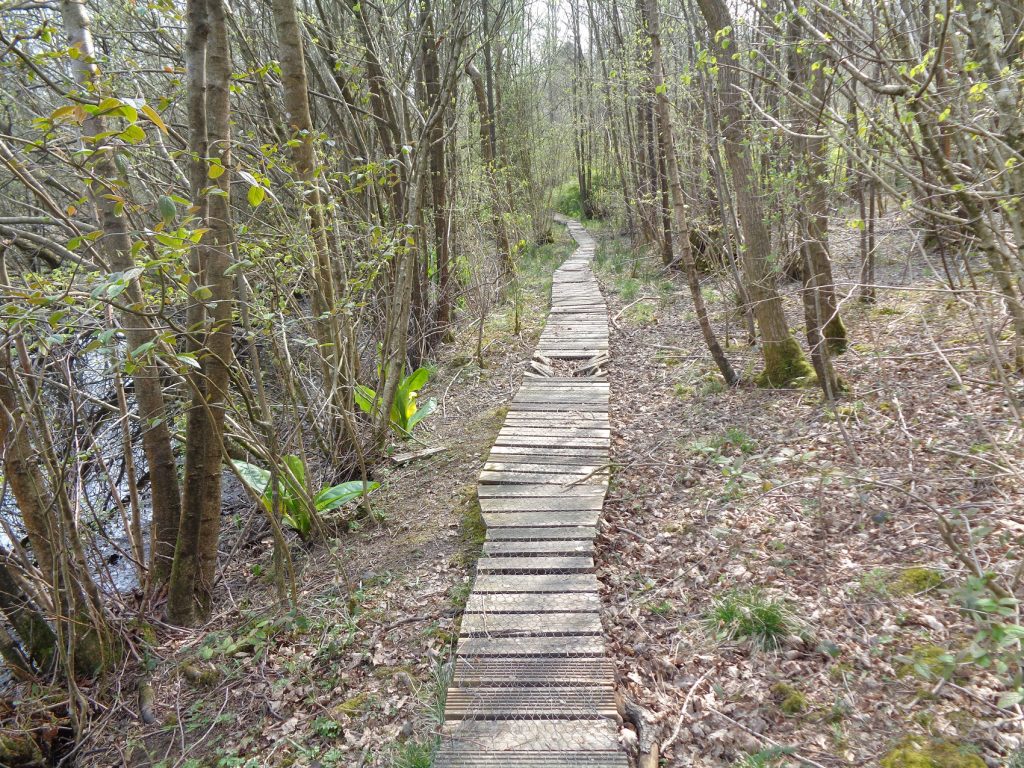
The narrow, rotting path to higher living standards(!) Witherslack boardwalk, 10th April 2020
The approaching climate disaster should be seen as an opportunity. It’s surely becoming obvious to everyone, that we have no choice but to permanently relax our feverish scrabble to consume. We can’t allow the Neo-liberal or Capitalist rapists of the earth to continue. Their economic lie keeps us all in a race against each other, countries and cultures at each other’s throats – and sadly, not just politics and almost all political parties have become slave to this lie, it has drastically infected our social attitudes and behaviour. We can’t have all the things we’ve been taught to want, the endless expansion instilled in us. Instead, we must develop a will to share – especially those who exist above the poverty line. Although such an argument must appear naïve, a simplistic point of view vulnerable to opponents whose only principle is the avarice of vested interests, its truth is obvious.
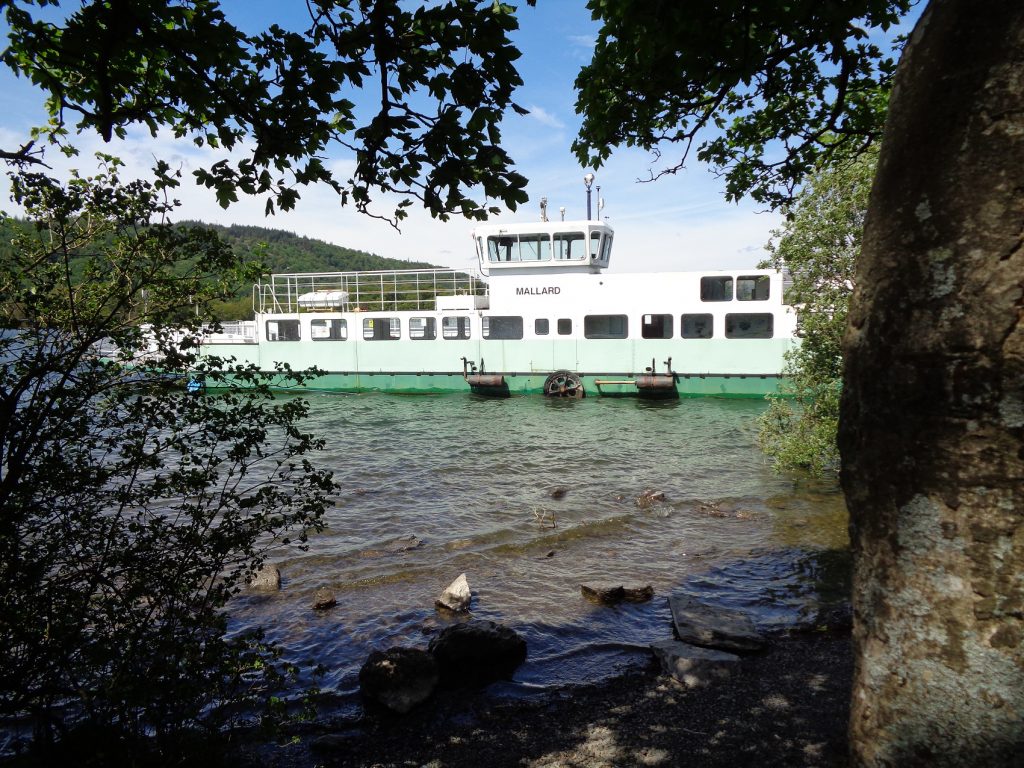
Mallard at Bowness Nab. After a long period of closure for essential maintenance and problems with the driveshafts, the Hawkshead cable ferry reopened on the 22nd March . . . only to be abandoned three days later – like all the ferries down at Lakeside noted in Impressions from Lakeland[xiii]
Human society is frequently dominated by two dubious values (both, it would claim, derived from instinct) the obvious one is greed, the other, sentimentality. That’s how governments control us during “lockdown”. Use emotional blackmail to bring it (belatedly) into force, then, when they’ve had enough of feeling cramped by their own rules[xiv], use the get-consuming-or-else argument, to push us back into work.
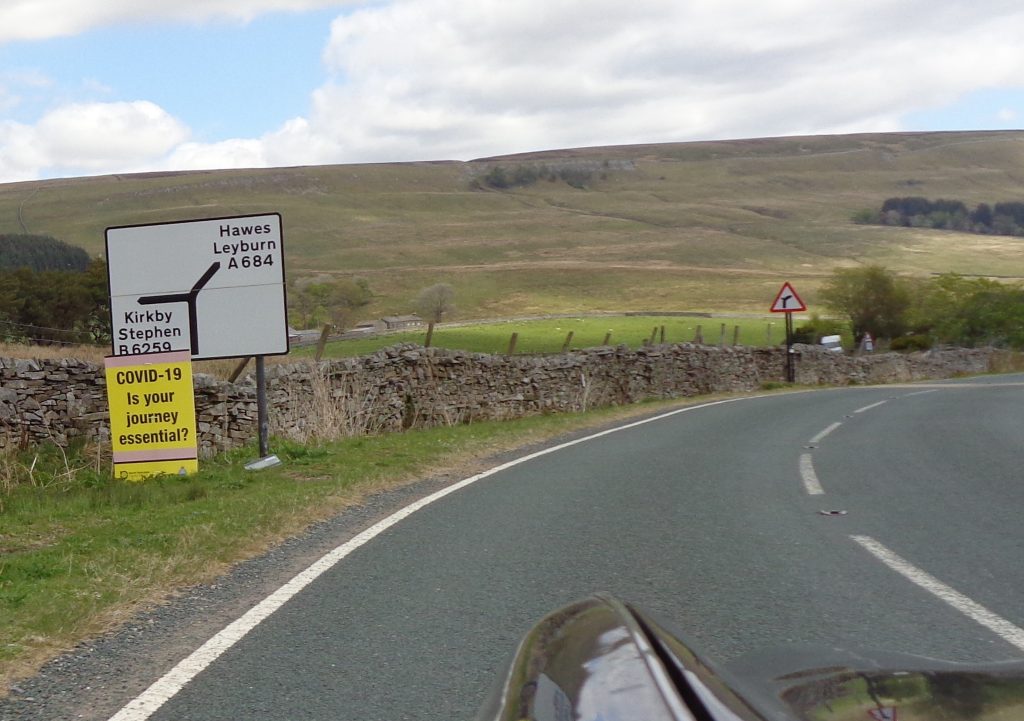
Even by the 14th of May, when “lockdown” had been slightly eased, like the Lakes, the Yorkshire Dales were largely abandoned[xv]
As for travel, there is plenty of waste inherent in the very idea – after all, what proportion of the travel we do as a race is essential in the essential sense? Unless we are refugees, almost none. Subsidized flying – subsidized at more than one level – however, is by far the worst culprit[xvi]. A textbook symbol of waste entirely taken for granted. Obviously, it’s easy for me to say this. I’ve only been on two return flights in fifty-eight years, one to Majorca[xvii] – in 1973, the other to Tunis in 1975[xviii]. They could dismantle the entire airline system tomorrow and I wouldn’t care. In fact, I’d be glad. Like the ridiculous space race of the 60s and 70s, it’s an expensive toy we should do without – a wasteful jet of hubris. A list of other items in this category – not least, all things nuclear – would last a long paragraph. Tales of moral bankruptcy . . .
Yet I realise that the end of air flights, for many would be a depression unto suicide. Therefore, in my utopian world, provided it could be achieved with little enough damage, each citizen could choose one return flight per year . . . always remembering that the majority of people in the world don’t have that choice – nor the choice to ‘travel’ at all except under duress.
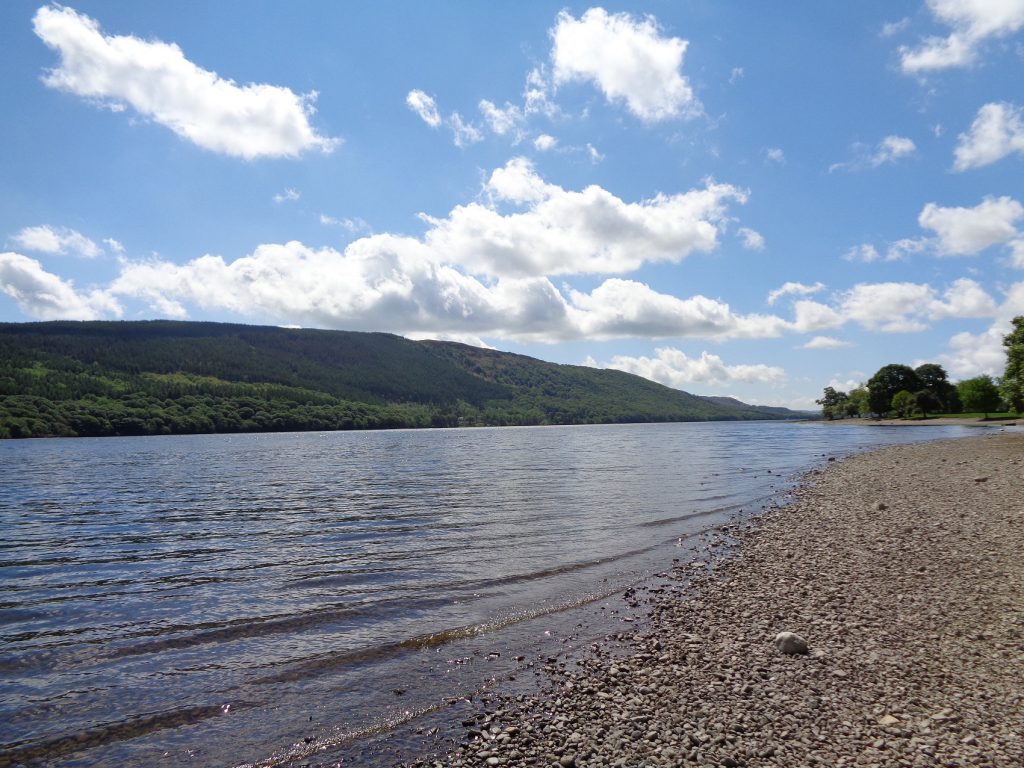
The uninhabited shore and lake of Coniston Water, looking south east, 21st May 2020
To see the Lakes, empty in Maytime, is a huge privilege, as is the reality of proper journeys over the hollow spell of flying’s quick arrival. When we went to Sardinia for 10 days in May-June of 2007, it took us 4 days to get there and 9 days to get back[xix]. While we were on the western coast just south of Alghero, we bumped into a nice enough couple who’d come for the weekend! They weren’t boasting. That idea of convenience and quick escape if you have the money, has become bred in the bone. Its wider damage stays hidden. No doubt they would have said that time is money; that they couldn’t afford a month off work to go to Sardinia. But is a good meal, a few hours at the beach and a bit of sex in an exotic locale – is that justifiable? Even the characters in a Ken Loach film[xx] do just about the same – which shows precisely how much we take such selfish and destructive behaviour for granted. Loach doesn’t present this as a criticism, simply as the truth – a common choice or freedom for whom others pay the price. And these days, even good weather is no longer very certain.
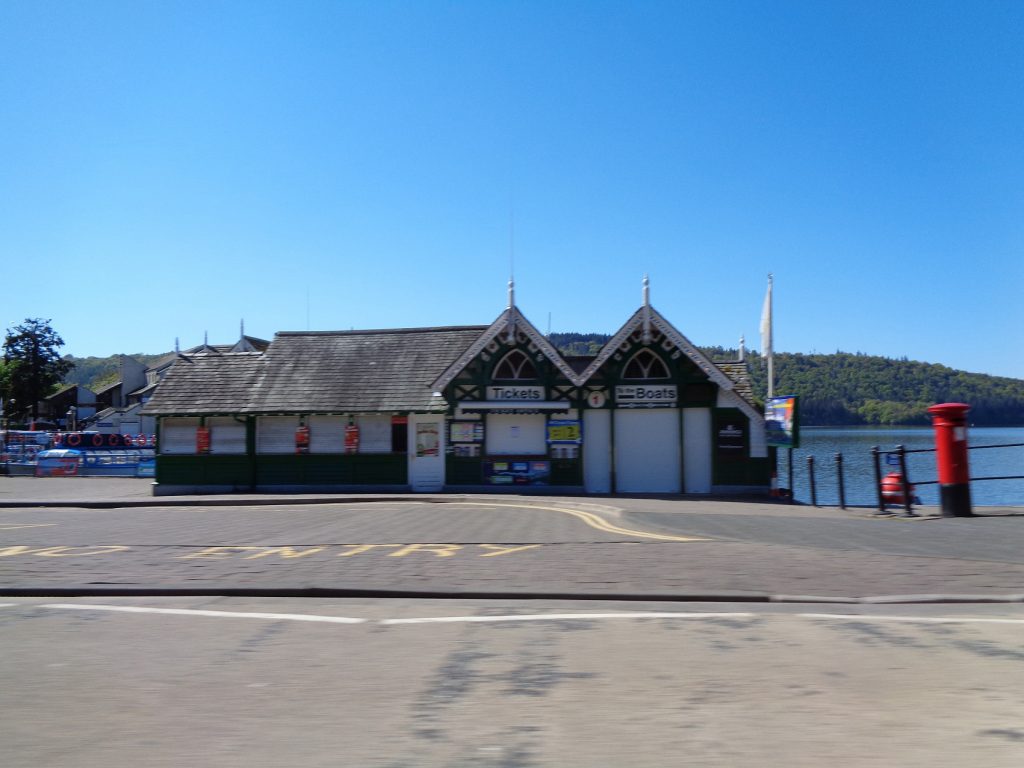
Has fear of The Satan Bug (1965)[xxi] cleared the bustling chaos of Bowness Quay? 6th May 2020
The subsidized convenience of the cheap flight is only one of many privileges that must be unlearned. It took us 3 years to save for our Sardinian holiday. Time is money – but not in the way we’ve all been taught to think. I don’t know what the average income of this country is, but I know that as a family we’ve always lived, in economic terms, below the poverty line: once or twice a long way below, mostly only a little. But unlike vast numbers of people on this planet, we are (temporarily) protected by being where we are, in a relatively affluent country, still living off what’s left of the attitude and wealth of empire.
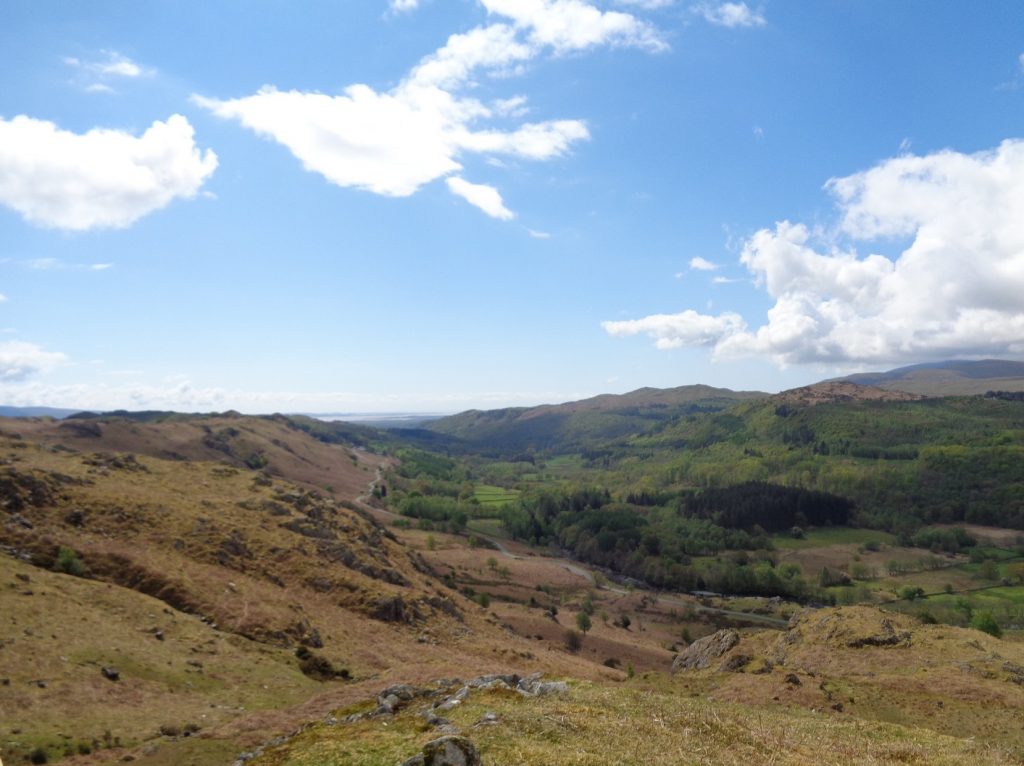
The Vale of Ulpha, 2nd May 2020
250 years ago, people began to be persuaded that the Lake District was not only sublime but acceptably, unscarily, beautiful. Isn’t it time to open our eyes wider, to look and think more for ourselves? Time to stop seeing all but the famous beauty-spots as mere backscenes . . . or off-limit parts of an agricultural machine. The land itself needs to be nationalized. I’m sick of big landowners who think they own it.
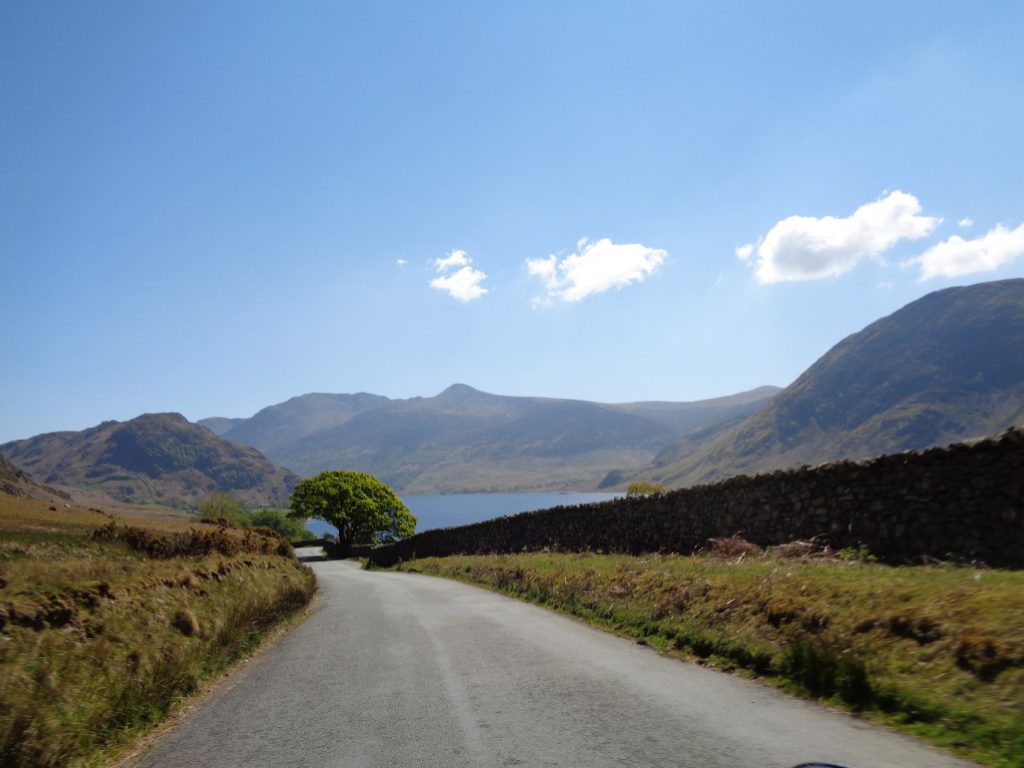
The deserted approach to Crummock Water, 6th May 2020
We are obviously lucky to have ended up on the edge of such a distinctive region as the Lakes – an area which should be open to all who wish to enjoy it respectfully[xxii]. Before moving here, I’ve lived in many other regions of the U.K. some more traditionally picturesque, others more subtle. The individual beauty of each varies, but singular or secretive, it’s always there – a walk, a cycle or a train ride away.
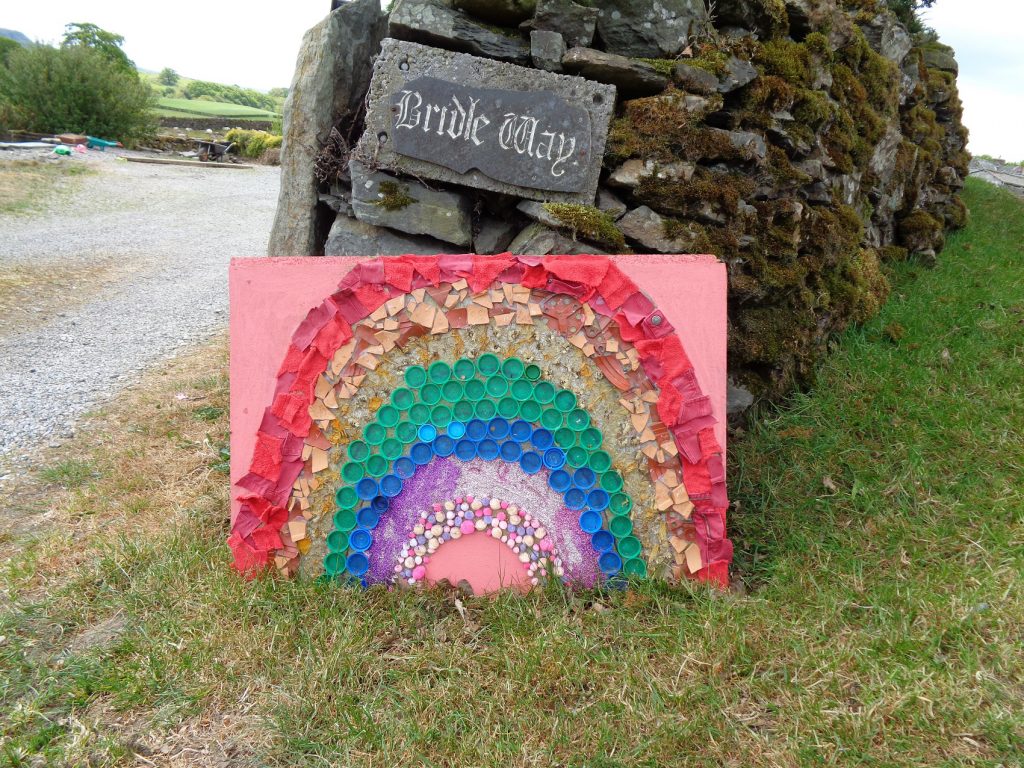
Cappelrigg Lane Rainbow, 13th of May 2020
EPILOGUE: On Bank Holiday Monday the 25th of May, before cycling on to Bowness, I met up (at a distance) with other members of Extinction Rebellion South Lakes, at Abbots Hall Park, Kendal. It was – as it has been so often recently – a perfect sunny day. Minutes later, a police officer arrived, observing that although we were distanced, it was still a social gathering. Courteously and perhaps tactically, a greatly distanced XR member pointed out to the policeman that he was too close to me. Ruefully, both he and I took a step back. After being assured that we were about to cycle off and being given a written description of our route (with its strong emphasis on an increased social distancing), the policeman apologized for disturbing us.
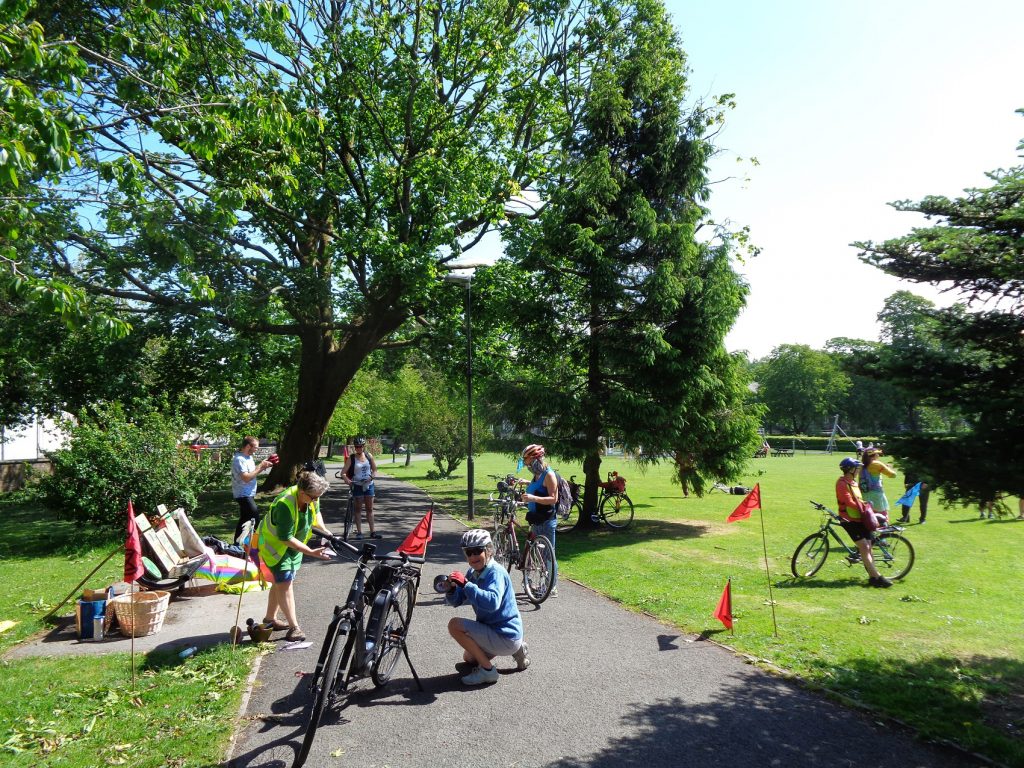
Social distancing isn’t great for photos trying to depict group solidarity – Kendal 25th May 2020
Local stalwarts had been up since the early hours painting temporary cycle lanes all along the “Reclaim Our Streets” route. 20 mph Zone signs adorned the lampposts and helped to slow the traffic as we looped the town two or three times, clanging bells and blowing whistles, (I had to go around again to find a lost flag). Occasionally, it was hard to distinguish friendly, supporting horns and shouts from vehicles, from those intended as abuse. Luckily, in response to one clear case of the latter, I managed to turn the beginnings of an unsuitable gesture into a friendly wave.
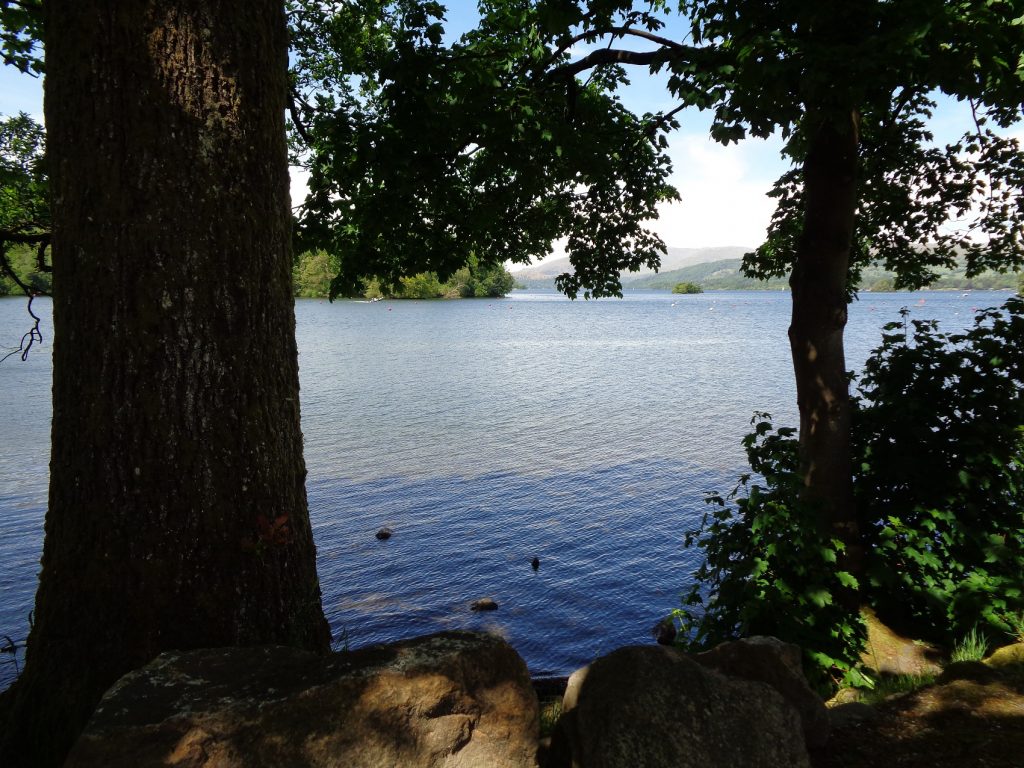
Windermere from the shore below The Glebe, Bowness-on-Windermere, Cumbia, 25th May 2020
As with Kendal town centre, traffic on the main road heading north-west was still relatively light. Although accompanied by a separate cycle path, the A591 is usually a route to avoid on account of noise and pollution. In Windermere the railway station was deserted, the main streets uncluttered. A mile on, the centre of Bowness was equally relaxed. Down by the lake however, on the bright green hillside known as The Glebe, things were busier. A large group of bikers, looking uncomfortably hot in protective clothing, were vaguely keeping apart, while plenty of ‘family groups’ were picnicking across the slope which commands such a spellbinding view of water and mountains. These crowds were nothing like as dense as those shown in the news at places such as Southend and Bournemouth[xxiii] – where many declared that if Boris’s most senior adviser could break the rules, why shouldn’t they. Are entrance points to the Lakes still being restricted in some way?
© Lawrence Freiesleben
Cumbria, May 2020
Postscript: Finally able to test the inflatable canoe we were given for Christmas, three of us set off from the eastern shore of Coniston Water, exploring Peel Island – named ‘Wildcat Island’ in one of my daughter’s favourite books, Swallows and Amazons – before crossing to the western shore for a picnic in the cooling shade. The shoreline and lake gradually got busier during the day . . . though not to the degree such weather would usually invite at this time of year. I think lockdown (phase 1) is as good as over in many people’s minds.
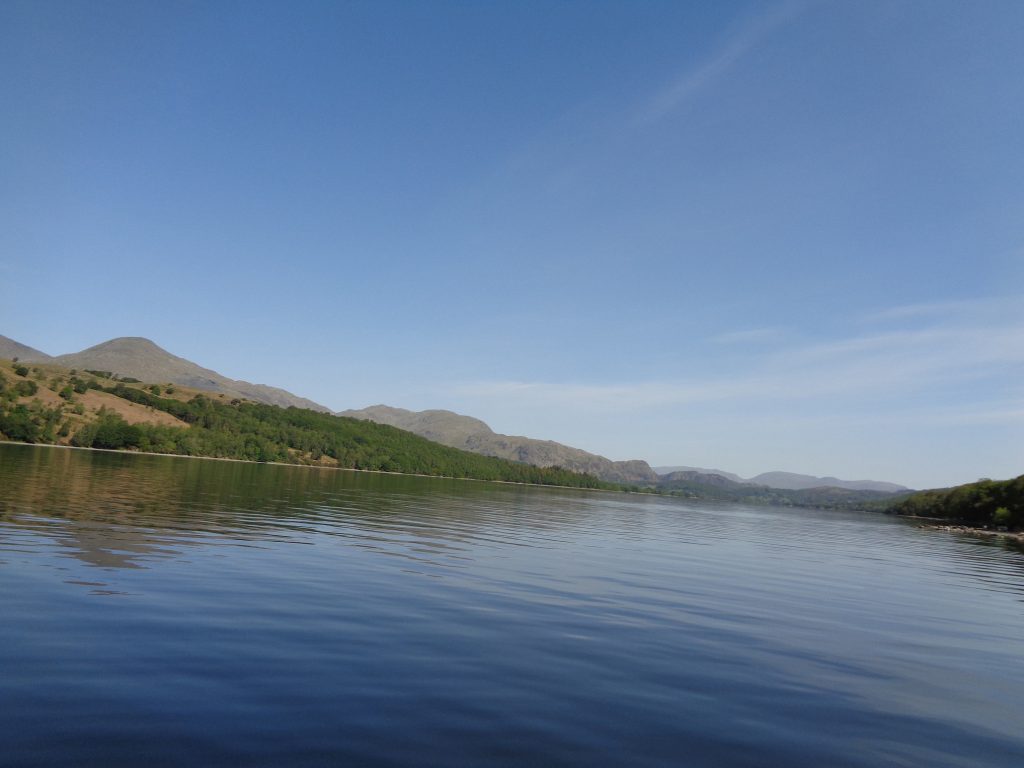
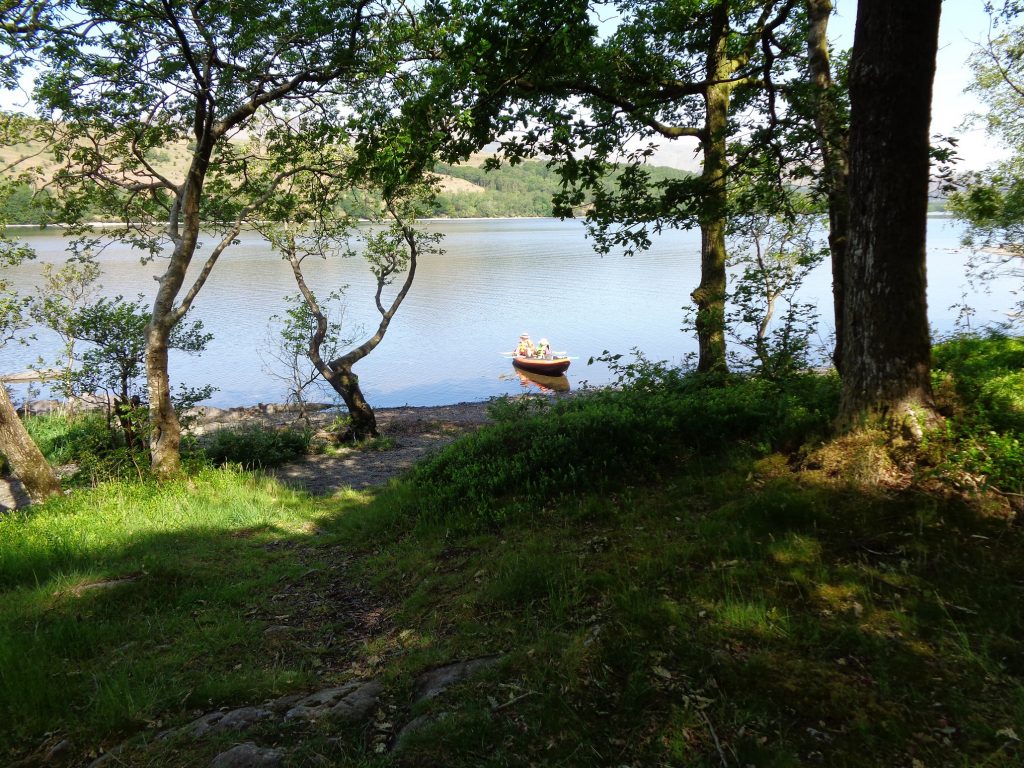
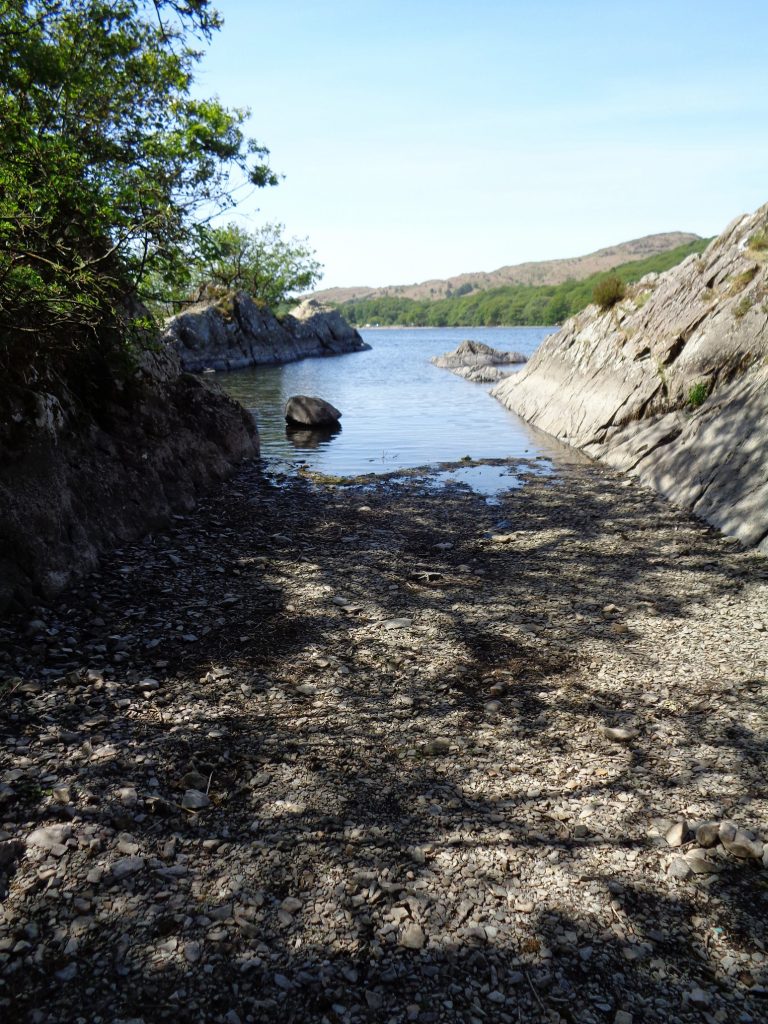
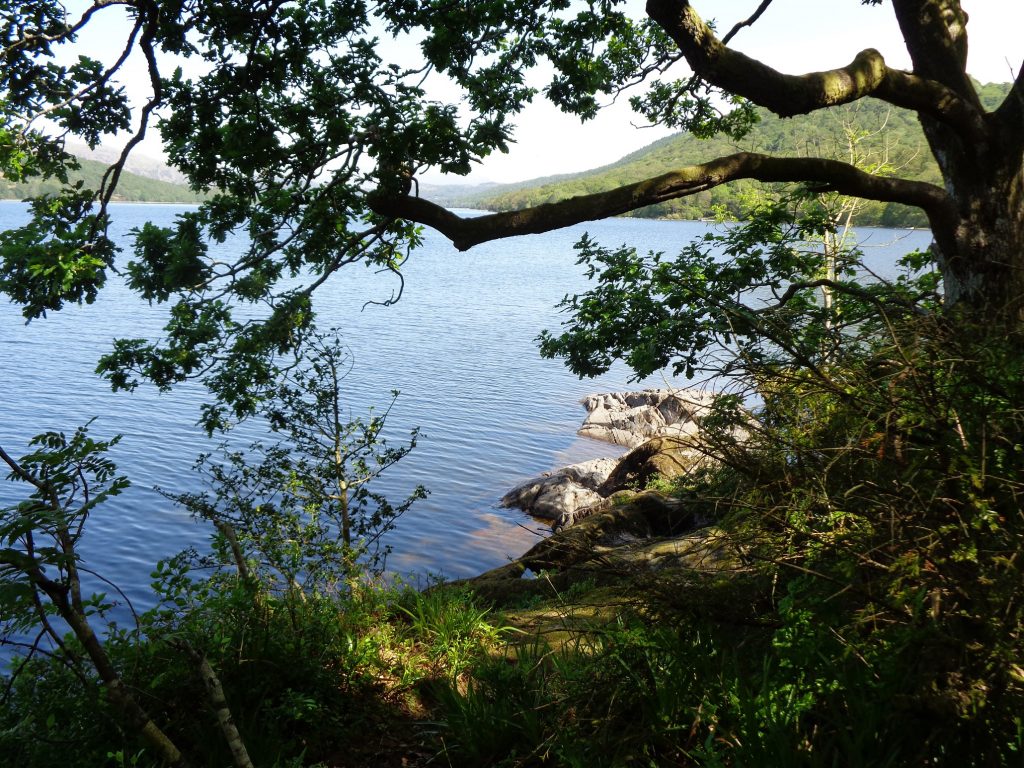
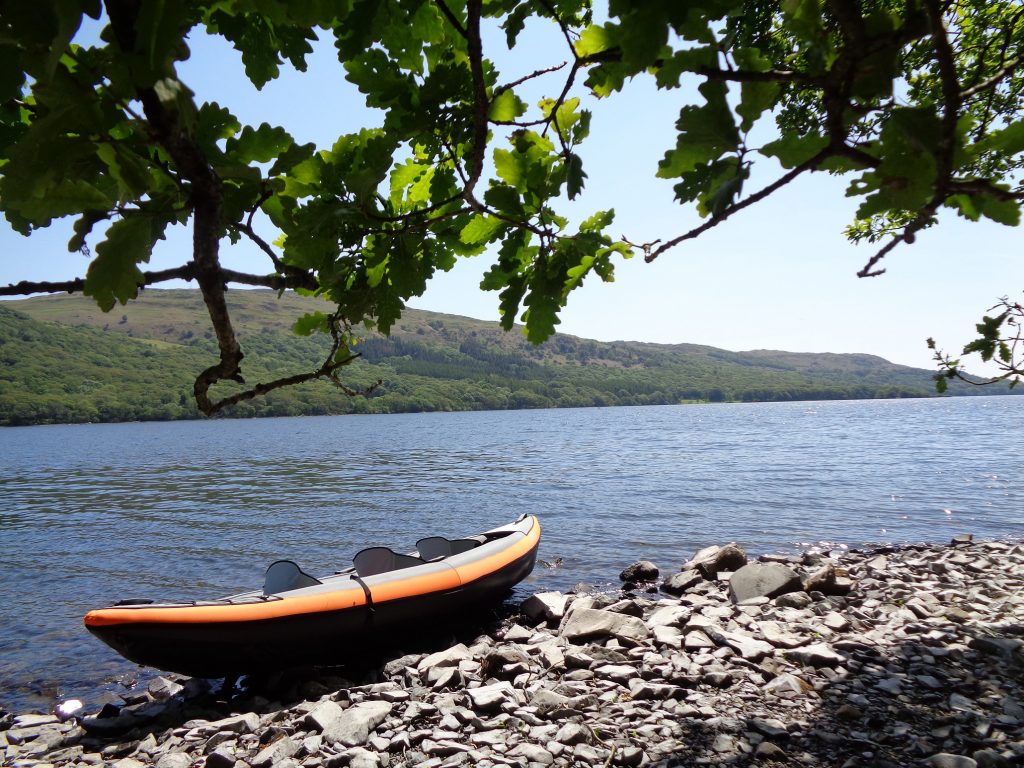
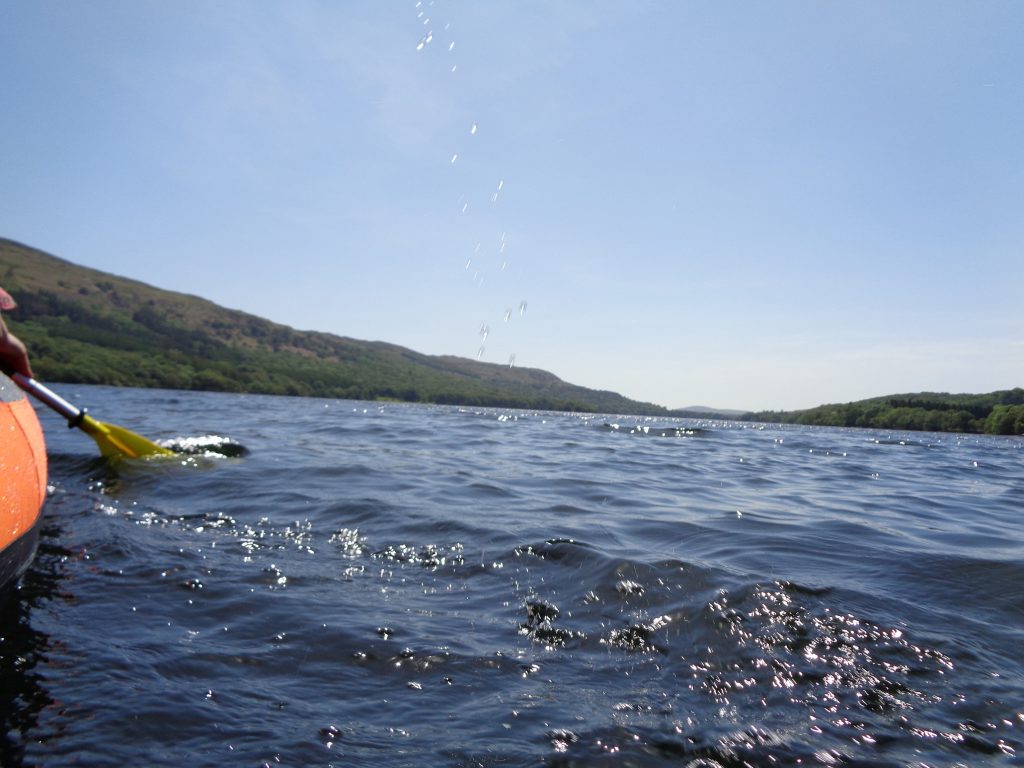
NOTES
[i] https://www.theguardian.com/commentisfree/2017/jul/11/lake-district-world-heritage-site-sheep
[ii] https://whc.unesco.org/en/list/422/
[iii] https://en.wikipedia.org/wiki/Romanticism
[iv] https://news.sky.com/story/coronavirus-only-9-of-britons-want-life-to-return-to-normal-once-lockdown-is-over-11974459
[v] https://pallantbookshop.com/product/time-away-notebook-corsica-alan-ross-john-minton/
[vi] https://en.wikipedia.org/wiki/Alan_Ross
[vii] So romantic that perhaps he could not bear the incessant shock of so-called reality? sadly killing himself in 1957 at the age of 39. https://en.wikipedia.org/wiki/John_Minton_(artist)
[viii] Our original plan was to explore Corsica as well, but we hadn’t sufficient time or money. K meticulously planned a trip there by train and ferry during May 2020 . . . which obviously had to be cancelled.
[ix] In three parts starting with: http://internationaltimes.it/places-not-to-rest-a-virtual-pub-crawl-then-now-part-1/
[xi] https://www.yha.org.uk/hostel/yha-honister-hause
[xii] https://www.independent.co.uk/news/business/analysis-and-features/these-10-companies-control-everything-you-buy-a7400971.html
[xiii] http://internationaltimes.it/impressions-from-lakeland/
[xiv] https://www.theguardian.com/commentisfree/2020/may/26/dominic-cummings-boris-johnson-terrified-sack-him
[xv] Through Kingsdale, Deepdale, Dentdale, Garsdale, Mallerstangdale and Rawtheydale only a few people were in evidence.
[xvi] https://www.dw.com/en/to-fly-or-not-to-fly-the-environmental-cost-of-air-travel/a-42090155
[xvii] As we knew it at the time – emphasis on the letter J.
[xviii] Two package holidays my parents could only afford because my uncle worked for B.E.A. (British European Airways) and could get us free flights. Most of the kids I knew on the housing estate went to Butlin’s Holiday Camp – a treat I’d long envied.
[xix] Using the motorail from Calais to Nice, our journey in a 45-year-old car took us along the coast to Genova, around stormy Sardinia and then back across Italy, the Alps, Austria, Lichtenstein, Switzerland, Germany, France, Luxembourg, Belgium and back to Devon, with a fair amount of sun, a little snow and far too much torrential rain.
[xx] The excellent and thought-provoking Ae Fond Kiss of 2004: https://www.imdb.com/title/tt0380366/?ref_=fn_al_tt_1
[xxi] https://www.imdb.com/title/tt0059678/
[xxii] As well as a severe reduction in the numbers of (subsidised) sheep, this kind of piratical business, encouraging the four-wheel wrecking of farm and mountain tracks, needs banning for good: http://kankku.co.uk/

like very reduced epilogue!! wish you had been able to include more pics of 25th
Comment by wendi lethbridge on 1 June, 2020 at 9:19 pm